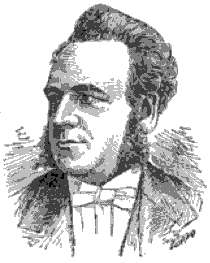Gilbert Haven facts for kids
Quick facts for kids
Gilbert Haven
|
|
|---|---|
 |
|
| Born | September 19, 1821 Malden, Massachusetts
|
| Died | January 3, 1880 (aged 58) Malden, Massachusetts
|
| Occupation | Clergyman |
| Spouse(s) |
Mary Ingraham
(m. 1851; died 1861) |
| Signature | |
Gilbert Haven (born September 19, 1821 – died January 3, 1880) was an important leader, called a bishop, in the Methodist Episcopal Church. He became a bishop in 1872. He was a big supporter of Clark College (which is now Clark Atlanta University). He imagined it as a major university for all the Methodist schools that helped educate freedmen (people who used to be slaves). He also led the Freedmen's Aid Society, which helped former slaves. A special burial area in Atlanta's Westview Cemetery called Rest Haven is named after him.
Contents
Gilbert Haven's Life Story
Gilbert Haven was born in Malden, Massachusetts on September 19, 1821. He married Mary Ingraham in 1851, but she sadly passed away ten years later. They had two children. One of their sons, William, worked for 29 years as a leader for the American Bible Society.
Gilbert Haven finished his studies with high honors from Wesleyan University in 1846. After that, he taught Greek and Latin. He loved to travel and visited many places like the Holy Land, Africa, Mexico, and Europe. He was one of the first people to speak up for equal rights for men and women.
He became a member of the New England Annual Conference in 1851. Later, he served as a bishop in Atlanta for a group made up entirely of African Americans. In 1877, while in Liberia, he got malaria. He never fully recovered from this illness. He passed away in Malden on January 3, 1880.
Beliefs and Contributions
Gilbert Haven strongly believed that all people are completely equal. He felt that if everyone is equal in God's eyes, then society should also treat everyone equally under the law. He was very against any kind of racial separation in churches.
Because his ideas about equality were so strong and unusual for his time, no Northern church group would accept him as a bishop. This is why he was sent to lead a mission conference made up only of Black members.
After the Civil War, he worked as the editor for Zion's Herald. This was a weekly newspaper for Methodists in New England.
His Writings and Legacy
Gilbert Haven wrote several books during his lifetime. These included The Pilgrim's Wallet (1864), which was about his travels. He also wrote National Sermons (1869), and Sermons, Speeches and Letters on Slavery and its War. Another book he wrote was Life of Father Taylor.
After he died, Benjamin Tanner, who edited The Christian Recorder, wrote about him. Tanner said that Haven was one of the few people who created public opinion instead of just following it. He was happy that Haven always stood up for the poor and those who were treated unfairly.
Bishop Haven is remembered in the Calendar of saints by the Order of St. Luke. This group recommends him for recognition within The United Methodist Church.
See also
- Clark Atlanta University
- List of bishops of the United Methodist Church
Images for kids
 | Isaac Myers |
 | D. Hamilton Jackson |
 | A. Philip Randolph |


